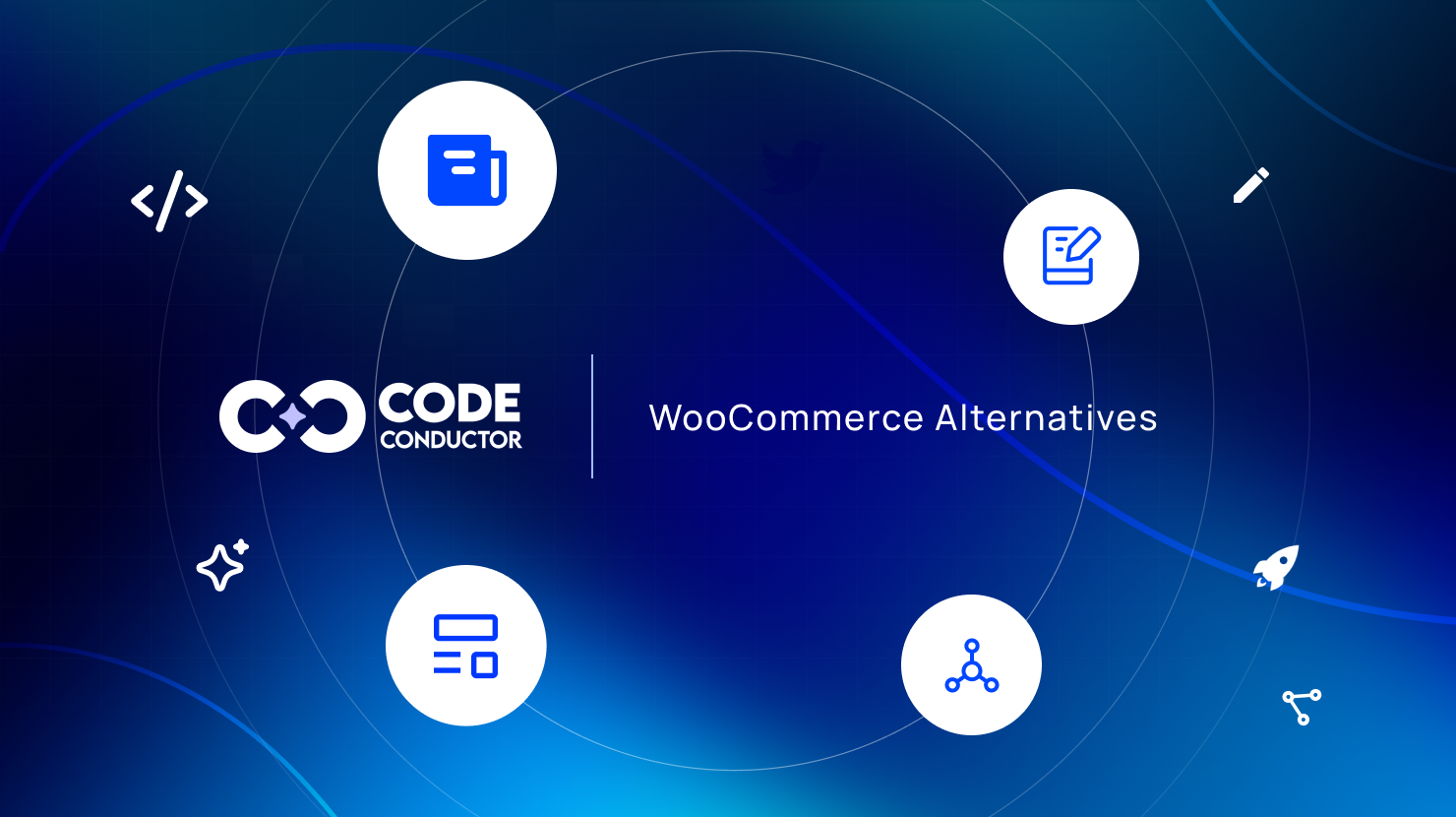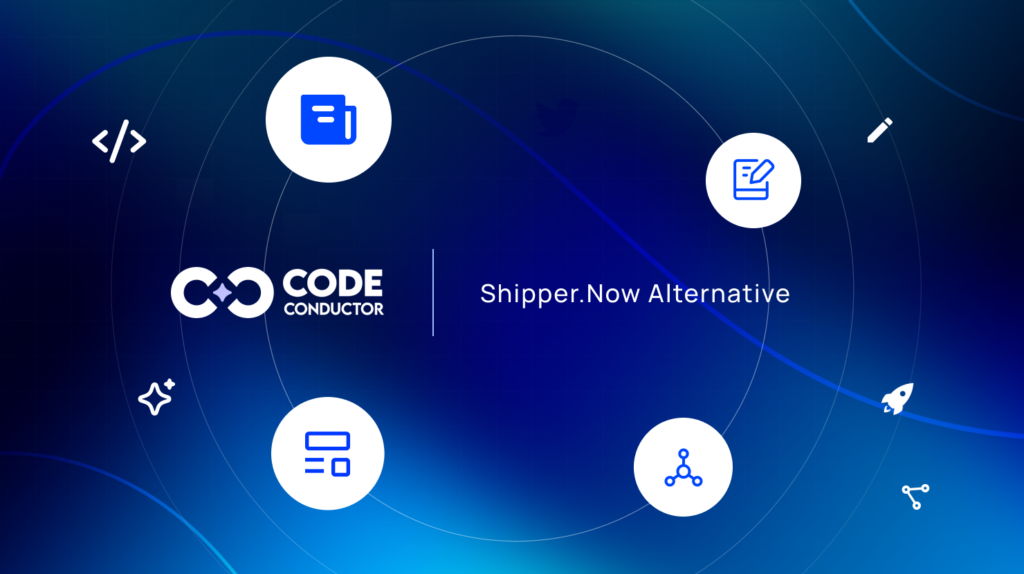WooCommerce, a popular plugin for WordPress, has long been a go-to solution for creating online stores. However, as the e-commerce market continues to grow and diversify, many entrepreneurs and store owners are exploring alternatives that better align with their unique needs and goals.
No matter how experienced you are in e-commerce or how new you are, choosing the right platform can be difficult. With a wide range of options available, each boasting its own set of features, pricing structures, and levels of complexity, it’s crucial to make an informed decision.
We Understand the importance of expertise, authority, and trustworthiness in the e-commerce space. That’s why we’ve researched and compiled a list of platforms that excel not just in features but in empowering businesses to thrive online. So let’s take a look!
In This Post
Why You Need WooCommerce Alternatives?
While WooCommerce has established itself as a prominent e-commerce solution, powering millions of online stores worldwide, it’s essential to recognize that its one-size-fits-all approach may not cater to every business’s unique needs. As we can see the e-commerce market continues to evolve, so embracing alternatives provides new opportunities and helps companies stay competitive.
Everyone needs a specialized online store that requires advanced customization, scalability, or a more user-friendly interface. That’s why exploring WooCommerce alternatives becomes paramount to ensure your e-commerce platform aligns with your specific business goals and customer expectations.
Here are some compelling reasons why you should consider WooCommerce alternatives:
- Technical Expertise: While WooCommerce offers great functionality, it requires a certain level of technical knowledge for setup, maintenance, and customization. If you’re a complete beginner or lack coding experience, navigating the intricacies of WordPress and plugins can be daunting.
- Limited Design Flexibility: WooCommerce relies on themes and plugins to modify the website’s appearance. While there are numerous options available, achieving a truly unique and customized storefront can require advanced knowledge or additional theme development.
- Scalability Concerns: As your business flourishes and your product catalog expands, managing a WooCommerce store can become increasingly complex. Upgrading your hosting plan and ensuring smooth operation might necessitate technical expertise.
- Focus on Pure E-commerce: WooCommerce integrates seamlessly with WordPress, which is primarily a blogging platform. If your sole objective is to build a robust online store with dedicated e-commerce functionalities, other platforms might offer a more streamlined experience.
Exploring WooCommerce alternatives is not about finding faults with WooCommerce but about recognizing this vast and varied digital world. After all, each business has its own set of requirements, growth plans, and customer expectations.
Pros and Cons of WooCommerce
As one of the most popular e-commerce solutions, WooCommerce has established a strong presence in the market, but it’s crucial to weigh its pros and cons objectively to determine if it aligns with your business needs or if exploring alternatives would be a better fit.
Here’s a comprehensive overview of the pros and cons of WooCommerce, presented in a structured table format for easy readability:
| Pros | Cons |
|---|---|
| Free and Open-Source: WooCommerce is a free, open-source plugin for WordPress, making it an affordable option for businesses on a tight budget. | Limited Out-of-the-Box Features: While WooCommerce provides basic e-commerce functionality, advanced features often require paid extensions or custom development, increasing costs. |
| Flexibility and Customization: With a vast ecosystem of themes and plugins, WooCommerce offers extensive customization options to tailor your online store to your specific needs. | Performance and Scalability Issues: As your store grows in size and traffic, WooCommerce may experience performance and scalability challenges, especially without proper optimization. |
| WordPress Integration: Seamless integration with WordPress, the world’s most popular content management system (CMS), provides a familiar and user-friendly environment for website management. | Reliance on Third-Party Extensions: Many essential features, such as payment gateways and shipping integrations, require separate extensions, increasing complexity, and potential compatibility issues. |
| Community Support: WooCommerce benefits from a large and active community of developers and users, offering abundant resources, tutorials, and support forums. | Security Vulnerabilities: As an open-source platform, WooCommerce can be susceptible to security vulnerabilities if not properly maintained and updated regularly. |
| Search Engine Optimization (SEO): Leveraging WordPress’s SEO-friendly architecture, WooCommerce allows for optimized product listings and store content for improved search engine visibility. | Steep Learning Curve: Mastering WooCommerce, particularly for advanced customizations and integrations, can have a significant learning curve, especially for non-technical users. |
It’s worth noting that while WooCommerce excels in areas like affordability and customization, it may fall short in terms of out-of-the-box features, scalability, and ease of use, especially for businesses with more complex or specialized needs.
By weighing these factors against your specific business goals, target audience, and resource constraints, you’ll be better equipped to make an informed decision on whether to embrace WooCommerce or explore more suitable alternatives.

What To Look for in WooCommerce Alternatives?
Before looking for WooCommerce alternatives, it’s crucial to have a clear understanding of the key factors that should guide your decision-making process. Each e-commerce platform offers a unique set of features, capabilities, and pricing structures, making it essential to align your choice with your business’s specific needs and long-term goals.
To ensure you make an informed decision, here are the critical aspects to consider when evaluating WooCommerce alternatives:
User Experience and Interface
- A user-friendly and intuitive interface can significantly enhance the shopping experience for your customers
- Look for platforms that prioritize modern design, responsive layouts, and seamless navigation
Scalability and Performance
- As your online store grows, your e-commerce platform must be able to scale seamlessly
- Evaluate alternatives that offer robust performance, even during high-traffic periods, ensuring a smooth shopping experience
Customization and Flexibility
- Every business is unique, and your e-commerce platform should reflect your brand identity and meet your specific requirements
- Assess the customization options and flexibility offered by each alternative, including themes, plugins, and APIs
Robust Feature Set
- Ensure the platform provides essential e-commerce features out-of-the-box, such as product management, inventory tracking, and secure payment gateways
- Consider industry-specific features that cater to your niche or specialized needs
Seamless Integrations
- Evaluate the platform’s compatibility with third-party tools and services you may need, such as marketing automation, analytics, and shipping carriers
- Seamless integrations can streamline your operations and enhance the overall customer experience
Cost and Pricing
- Understand the platform’s pricing structure, including setup fees, transaction fees, and any additional costs for add-ons or premium features
- Ensure the pricing aligns with your budget and offers scalability as your business grows
Security and Compliance
- Online security and data protection should be a top priority for any e-commerce platform
- Look for platforms that prioritize security measures, such as SSL encryption, PCI compliance, and regular updates
Customer Support and Resources
- Reliable customer support and comprehensive resources can be invaluable, especially when facing technical issues or seeking guidance
- Evaluate the platform’s support channels, documentation, and community forums
Top WooCommerce Alternatives in 2026
Businesses are constantly seeking innovative solutions that can streamline their online operations and provide a seamless shopping experience for their customers.

While WooCommerce has carved out a significant niche, a myriad of alternatives have emerged, each offering unique features and capabilities tailored to diverse business needs.
1. CodeConductor
CodeConductor is a revolutionary AI-powered No-Code App & Website Builder that has redefined the way businesses approach online presence. With its cutting-edge technology, CodeConductor empowers entrepreneurs and companies to create stunning websites in just seconds, without the need for extensive coding knowledge or web development expertise.
Key Features:
- AI-driven website creation process
- Responsive and mobile-friendly designs
- Seamless E-commerce integration
- Build an SEO-optimized website
- Provide hosting solutions
- Complete GitLab Access for Source Code
2. Shopify
Shopify has established itself as a leading e-commerce platform, renowned for its user-friendly interface and comprehensive set of features. Whether you’re starting out or have an established business, Shopify offers a seamless way to build and manage your online store. Check out a great Shopify alternative which fulfill your e-commerce needs!
Key Features:
- Customizable storefront themes
- Secure payment gateways
- Inventory management and order tracking
- Marketing and SEO tools
- Mobile app for on-the-go management
3. BigCommerce
Designed with scalability and flexibility in mind, BigCommerce caters to businesses seeking a robust e-commerce platform capable of handling high-volume traffic and complex operations. With its advanced features and enterprise-level capabilities, BigCommerce empowers businesses to grow and evolve without limitations.
Key Features:
- Unlimited product listings and bandwidth
- Advanced product filtering and merchandising
- Multi-channel selling capabilities
- Customizable checkout experiences
- Comprehensive analytics and reporting
4. Jotform Store Builder
Jotform Store Builder is a highly accessible and user-friendly platform tailored for creatives, artists, and small businesses. With its intuitive interface and streamlined setup process, Jotform Store Builder allows you to establish an online presence and start selling your products or services with ease.
Key Features:
- Drag-and-drop store builder
- Integrated payment processing
- Product management and inventory tracking
- Custom branding and design options
- Mobile-optimized storefronts
5. Wix eCommerce
Wix eCommerce seamlessly blends website design and e-commerce capabilities, empowering businesses to create visually stunning online stores with minimal effort. Whether you’re a seasoned retailer or a newcomer to the e-commerce world, Wix eCommerce offers a comprehensive solution for showcasing and selling your products online.
Key Features:
- Stunning website templates and designs
- Secure online payment and shipping options
- Inventory management and order tracking
- Email marketing and abandoned cart recovery
- Mobile-friendly and responsive storefronts
Conclusion
While WooCommerce has carved a significant niche, exploring its alternatives can open doors to new opportunities and unlock a wealth of features tailored to your unique business needs.
From AI-powered software development platform like CodeConductor to enterprise-level solutions like BigCommerce, the options are vast and diverse.
Ultimately, the choice of an e-commerce platform should align with your business goals, target audience, and operational requirements. It is crucial to consider factors such as user experience, scalability, customization options, and cost-effectiveness before making a decision that will propel your online store forward.
Are you ready to revolutionize your online presence and take your e-commerce business to new heights?
Get a stunning, fully functional e-commerce website in just seconds with CodeConductor, the AI-driven website builder. No more complex coding and time-consuming web development processes. With CodeConductor, you can focus on growing your business while leaving website creation to its AI. Visit CodeConductor today and experience the future of e-commerce website building.
Best WooCommerce Alternative – Try it Free
FAQs
Is there anything better than WooCommerce?
There are various WooCommerce alternative platforms: CodeConductor, Shopify, BigCommerce, Jotform Store Builder, Wix eCommerce.
These platforms are built from the ground up for ecommerce and offer more robust features and scalability to support your business’s expansion.
E-commerce platforms offer secure payment gateways, inventory management, order tracking, SEO optimization, mobile responsiveness, and seamless third-party integrations.
While WooCommerce is a plugin that turns WordPress sites into online stores, making it suitable for small sellers already using WordPress. It’s the best choice for businesses looking to scale and grow their online presence. However, if you want to grow your online store.
Who should use WooCommerce?
WooCommerce is a user-friendly platform that enables businesses of all sizes to create online stores and sell products/services. It’s easy to set up, and offers extensive features and customization options, allowing businesses to build professional websites tailored to their needs without extensive technical knowledge.
Why should I choose a WooCommerce alternative?
Businesses may need alternatives to WooCommerce for a couple of reasons. Firstly, as a business expands and experiences growth in traffic and sales, it requires a more scalable platform capable of handling increased demands. Some alternative solutions offer robust scalability suited to businesses of any size.
Secondly, the lack of certain built-in features and functionalities in WooCommerce may prompt businesses to explore alternatives that better align with their specific requirements out of the box.
Is CodeConductor better than WooCommerce?
Yes, CodeConductor is better than WooCommerce. While WooCommerce is tied to WordPress and can only be used with WordPress websites, CodeConductor is a standalone platform. This means you are not restricted to using it with any specific website builder or content management system. CodeConductor provides greater independence and versatility in building and managing your online store without being limited to a particular ecosystem.

Founder CodeConductor






